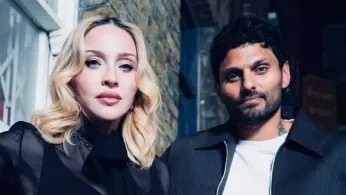
6 hours ago
Madonna Opens Up About Suicidal Ideation and Spiritual Survival on Jay Shetty Podcast
READ TIME: 7 MIN.
In a rare, deeply personal interview aired September 29, 2025, on Jay Shetty’s On Purpose podcast, Madonna—the Queen of Pop and a longtime LGBTQ+ icon—spoke openly about experiencing suicidal ideation during the highly publicized custody battle over her son Rocco Ritchie. The conversation has sparked global dialogue about mental health, resilience, and the unique pressures faced by public figures and members of marginalized communities.
Madonna described the prolonged legal struggle with her ex-husband, filmmaker Guy Ritchie, over custody of their teenage son as “one of the most painful moments” of her life. The dispute began in 2015, when Rocco, then 15, chose to stop traveling with Madonna during her Rebel Heart Tour and moved to London to live with his father. The ensuing transatlantic battle lasted nearly a year before being settled in September 2016, with Rocco remaining in London with Ritchie.
Reflecting on this period, Madonna revealed, “There were moments in my life where I wanted to cut my arms off… I actually contemplated suicide. It probably sounds really weird coming from me because I’m not emo, but I was like, ‘I can’t take this pain anymore.’”
She recounted nights spent lying on her dressing room floor, overwhelmed by the emotional trauma, yet still performing for tens of thousands of fans. “Someone trying to take my child away from me was like, they might as well just kill me. That’s really how I was thinking.”
Madonna credited her survival to her spiritual practices, particularly her study of Kabbalah, a branch of Jewish mysticism she adopted in the late 1990s. She explained to Shetty, “If you don’t have a spiritual life, you’re suffering all the time… There have been times when I’ve been really challenged and really suffered, and if I don’t have a spiritual life, I don’t know how… As soon as you understand what’s happening to you is a challenge that you are karmically meant to experience and learn from and evolve to a higher level of consciousness, then you can look at that event as a lesson and not punishment.”
This perspective, she said, allowed her to reframe her suffering, transforming deep personal pain into growth and empathy. Madonna asserted that her spiritual journey was not only a source of comfort but a tool for resilience and personal evolution.
Madonna’s openness about mental health struggles, particularly suicidal ideation, has special resonance within LGBTQ+ communities, where issues of mental health, family rejection, and resilience are often closely intertwined. The significance of her story lies not only in her celebrity but in the way her vulnerability challenges stigma and fosters a sense of solidarity.
For many LGBTQ+ individuals, public figures like Madonna serve as powerful examples that emotional pain, even at its most acute, can be survived and transformed. Her insistence on the necessity of a support system—spiritual or otherwise—echoes the importance of chosen families and community support networks, themes deeply rooted in LGBTQ+ history and activism.
Mental health organizations such as The Trevor Project and Stonewall consistently emphasize the need for visibility and open discussion around mental health and suicide prevention, especially for LGBTQ+ youth and adults. Madonna’s testimony, broadcast to millions, contributes meaningfully to this ongoing conversation by normalizing help-seeking and underscoring that even those perceived as strong or untouchable can struggle and heal.
Madonna’s impact as an LGBTQ+ ally has spanned decades, from her early AIDS activism in the 1980s to her ongoing advocacy for equality and representation. Her willingness to discuss personal vulnerability in such a public way is consistent with her legacy of challenging taboos and creating space for marginalized voices.
By sharing her struggles, Madonna continues to model authenticity and resilience for LGBTQ+ listeners—affirming that survival, growth, and connection are possible, no matter the depth of pain. In a world where many still face discrimination, isolation, and stigmatization, her words offer hope and solidarity.
As mental health remains a critical issue in the LGBTQ+ community and beyond, Madonna’s revelations highlight the need for culturally competent support, ongoing advocacy, and the power of storytelling. Her appearance on Jay Shetty’s podcast is more than a celebrity confessional—it is a call for compassion, understanding, and action.
If you or someone you know is struggling with suicidal thoughts, support is available. In the United States, the Suicide & Crisis Lifeline can be reached by dialing 988. For LGBTQ+ youth, The Trevor Project offers crisis intervention and suicide prevention services at www.thetrevorproject.org.






